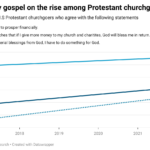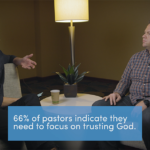
What can pastors and church leaders do to encourage frequent attendees to join and participate in the local church?
By Michael Wittmer
Many Americans believe they can know and love God without attending church. And many Christians believe they can know and love God without joining one. According to the 2022 Lifeway Research State of Theology report, only 68% of evangelicals agree every Christian has an obligation to join a local church. And 41% say worshiping alone or with one’s family is a valid replacement for regularly attending church.
There are many reasons for church decline, including rising secularism, expressive individualism, anti-institutionalism, and a misunderstanding of the priesthood of all believers. But pastors can take some steps to combat dechurching in our communities. What can we do to encourage frequent attendees to join and participate in our churches?
Cherish the church
First, celebrate the church. Pastors have a huge advantage in our fight for the church. We bring the Word of God that creates reality then frames it for our people. God’s Word says the church is the most important institution in the world. We are the temple of the living God, the body and bride of Christ, the one thing the gates of Hades cannot stop. The church is worth sacrificing our lives for. Who would not want in on that?
“God’s Word says the church is the most important institution in the world.” — @MikeWittmer Click To TweetSome of our attendees say they already belong to the universal church. Where does the Bible say they must also join a local church? But the local church is how we access the universal church, which is present in each local church (Hebrews 12:22-23). Paul wrote his letters to local churches, not free-range Christians.
While it may be possible to believe in Jesus and not belong to a local assembly, it never occurred to any apostle that anyone would try. The New Testament has no category for a follower of Jesus who does not belong to a local church. If someone refused baptism and membership in a local church, they would not be counted as a genuine believer. How can we say we belong to the Head (Jesus) if we don’t belong to the body? We are an amputation, hideous rather than helpful. Who wants to be a severed hand or eye? Join the body.
Cherish your church
Beyond celebrating the church in general, we must enthusiastically make much of ours. We must avoid what Karl Barth called ecclesiastical Docetism, loving the idea of church but not our particular one. What good is it to love marriage in the abstract if we don’t love our particular spouse? What good is it to love church in the abstract if we don’t love the one we’re in?
Pastors have a platform to remind our churches how much we love them. I write weekly notes in the bulletin, between 250-300 words, to thank individuals, celebrate accomplishments, and tell the church how grateful I am to be their pastor. And I savor the weekly benediction. The last thing I do each service is raise my hands over our church family and call down our Father’s blessing. What a privilege! Loving your church won’t lead everyone to join and participate. We have a few stubborn holdouts. But we have also enjoyed many breakthroughs, including elderly couples who join our assembly even as their lives come to a close. How gratifying!
“What good is it to love church in the abstract if we don’t love the one we’re in?” — @MikeWittmer Click To TweetDemand more
Perhaps some people are reluctant to join a church because they don’t see the point. As far as they can tell, the church exists to produce an experience for them to enjoy. They are not asked to do much, not even sing. Many churches now sing with the lights down in the congregation and the sound up on the stage. The result is a professional concert for the audience to consume. Some try to sing along, but the melodies are difficult and their voices are drowned out by the praise band. They get the message they don’t matter. The service would have the same energy if the congregation wasn’t even there.
But rather than lower expectations of our people, we should seek to raise them. For example, at our church, we want everyone to sing, serve, and greet at least two people after the service. We encourage attendees to join our church because Jesus is worth it and so are we. We love what the Spirit is building among us and want others to enjoy it too. While we welcome regular attendees to serve in some areas, membership opens whole new levels of leadership, opportunity, and accountability. If you are a member and you fall away, we will come for you.
“While we welcome regular attendees to serve in some areas, membership opens whole new levels of leadership, opportunity, and accountability.” — @MikeWittmer Click To TweetLet them decide
I lay out the options before our congregation and invite each person to choose. I explained that different kinds of membership require different levels of commitment.
The lightest kind of membership is the informal “commitment” of sports fans. Two kids in a treehouse may proclaim themselves members of Lions Nation. But when they grow up, they might shift their loyalties. Easy come, easy go.
One step up from sports is membership in an online “community.” Social media and travel websites demand our contact information, which we give so we can post pictures or get a member discount. We fill out a form, and we’re good to go.
Sam’s Club and Costco memberships require and give a bit more. We pay a membership fee and receive a physical card that enables us to shop.
Joining a college community requires more effort and pays more dividends. We apply for admission and financial aid, attend classes, write papers, take exams, and hang out in the dorms and cafeteria with friends. Graduation does not end our relationship; our alma mater will stay in touch.
Employment requires even more commitment and paperwork. We fill out forms for taxes, retirement, health insurance, background checks, and non-compete clauses. We may give a large chunk of our lives to this company, and we can’t leave without a two-week notice.
Our largest commitment is marriage. We spend thousands of dollars on a wedding, sign a marriage license, and vow before God and witnesses to remain faithful until death.
Each level of membership requires deeper commitment, higher involvement, and more paperwork. Each ascending level is more important and harder to get out of. So I ask three questions:
1) Where on this spectrum is belonging to a local church?
2) Where on this spectrum do you think God puts church membership?
3) Have you done that?
If you suspect God wants more from you, you won’t be surprised to learn there are forms to fill out. Membership folders are available on the back table.
For permission to republish this article, contact Marissa Postell Sullivan.













